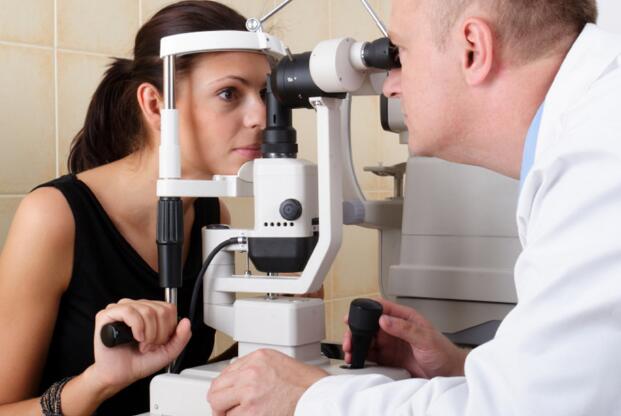
If your diabetes is uncontrolled for a long period, you could develop eye conditions that can lead to blindness.
That’s because diabetes – both Type 1 and Type 2 – can cause damage to your eyes over the long term.
“The excess sugar in the blood affects the walls of blood vessels throughout the body,” says Dr. Ming Wang of Wang Vision Institute in Nashville, Tennessee. “The smallest blood vessels in the body have the thinnest walls and are affected first. Because the eyes have some of the smallest blood vessels in the body, they are often one of the first systems affected.”
One of the most common problems that can happen over time is diabetic retinopathy. “Diabetic retinopathy occurs as a result of changes to the retinal blood vessels that can cause them to bleed or leak fluid,” says Dr. Lama A. Al-Aswad, an associate professor of ophthalmology and director of the Tele-Ophthalmology Initiative and Glaucoma Fellowship at The Edward S. Harkness Eye Institute, Columbia University Medical Center, in New York City. “In addition, bad vessels can develop that can leak, bleed and destroy the eye, resulting in blindness.”
One scary part is that you may not have any symptoms initially. However, later in the disease, you can notice a fluctuation in your vision, problems with your central and color vision, various floaters and vision loss. In fact, without treatment, total vision loss can occur within several years, Al-Aswad says.
About 40 to 45 percent of Americans with diabetes have some form of diabetic retinopathy, although only half of them are aware of it, according to the National Eye Institute.
An earlier stage of diabetic retinopathy is called nonproliferative, and the later stage is called proliferative diabetic retinopathy. With proliferative diabetic retinopathy, certain blood vessels can close off, but new ones will grow in their place and potentially affect your vision.
Efforts to treat diabetic retinopathy include injections into the eye and laser treatments, both of which can improve your vision. However, the treatments work best when started at earlier stages of the condition.
In addition to poorly controlled blood sugar over time, smoking and an older age put you at a higher risk for diabetic retinopathy, says Dr. Mark Goldfarb, an ophthalmologist with Advanced Eye Care in River Edge, New Jersey.
Another common eye problem in those with diabetes is diabetic macular edema, or DME. “Because of uncontrolled blood sugar, the vessels in the area responsible for the central vision can either leak, or new vessels can form and cause swelling and bleeding in the macula,” Al-Aswad says. Diabetic macular edema is vision-threatening as well. The patients at greatest risk for DME are ones with poorly controlled blood sugar over a long time.
RELATED CONTENT
What Is Diabetic Retinopathy?
“Many forms of diabetic macular edema need to be treated,” Wang says. “There have been recent advancements in the treatment of this condition that can help prevent permanent loss of sight if it is detected and treated early.”
[See: 10 Myths About Diabetes.]
There is some evidence that shows open-angle glaucoma, an eye condition that can affect anyone, is more common in people with diabetes. Open-angle glaucoma, which is caused by increased pressure in the eye and a wide angle between the iris and cornea, is a long-term condition that requires regular use of medicated eye drops, Wang says.
People with diabetes also are at a greater risk for a rare type of glaucoma called neovascular glaucoma. Neovascular glaucoma comes with a very high risk of blindness. “In this condition, fragile new blood vessels grow in the drainage system in the eye, leading to a significant elevation in eye pressure. This form of glaucoma is much more difficult to treat,” Wang says. Treatment involves surgeries in the eye and possibly the use of a kind of medication called an anti-vascular endothelial growth factor.
As if those conditions aren’t enough, another eye problem more common when you have diabetes is a cataract. A cataract is a normal clouding of the vision in the eye as you get older. However, you may develop cataracts at a younger age when you have diabetes. “It is unknown why this occurs, but better blood sugar control slows and delays the cataract formation,” Al-Aswad says.
Cataract surgery involves implanting an artificial lens in the eye for clearer vision.
“For diabetic patients who have cataracts, we often treat their cataracts a bit earlier and carefully counsel the patients before surgery because open eye surgery such as cataract surgery does have the risk of worsening diabetic retinopathy,” Wang says.
Your best bet to avoid or lessen the effects of these eye problems when you have diabetes is to schedule regular checkups with an eye doctor.
Adults with Type 1 diabetes should have an eye exam within five years of diagnosis, according to the American Diabetes Association. If you have Type 2 diabetes, you should schedule an eye exam when you are diagnosed with Type 2 diabetes. That’s because even if your diabetes has just been diagnosed, you may have been living with poor blood sugar control for years – and that may have caused wear and tear on your eyes.
Eye problems also can affect women who develop gestational diabetes while pregnant, so they should be screened as well, Goldfarb recommends.
“Annual eye exams can detect eye disease that can otherwise occur without eye symptoms. Many eye diseases can start this way, and if a patient waits to have their eyes checked until symptoms such as blurry vision or sight loss start to occur, it can often be too late for effective treatment,” Wang says.
Generally speaking, you’ll want to see your eye doctor once a year, but more frequent visits may be needed if you develop one of the eye conditions discussed here, Goldfarb says.
Of course, the usual diabetes management tips you’ve probably heard before are also helpful.
“Controlling diabetes through diet control, the use of medication, weight loss and exercise can prevent vision loss,” Al-Aswad says.
查看原文章链接




